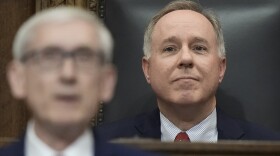There are approximately 50 million people living with some form of dementia, including Alzheimer’s, worldwide, according to the World Health Organization. This rate is expected to nearly double by 2030, and triple by the year 2050. The global costs of dementia was estimated to be around $1 trillion in 2018 and are expected to rise drastically.
"This is a coming train wreck," states Chuck Stetson, head of the Stetson Family Office (SFO) and founder of the Healthcare Impact Foundation (HCIF). The foundation focuses on treating and preventing Alzheimer's and other chronic diseases.
READ: Wisconsin Researchers Look For Ways To Prevent Dementia
"In an era where health care costs are spinning out of control, why aren't we focused on prevention when it's right in front of us and we actually have the data?" adds Stetson.
The data he refers to is the Risk Reduction Guidelines for Alzheimer’s, recently release by the UN World Health Organization. This report confirmed earlier research showing that up to one-half of all Alzheimer’s diagnoses can be postponed, reduced and even prevented through simple lifestyle changes.
Not using tobacco, drinking less alcohol, eating well (a Mediterranean diet is best), and incorporating cognitive training can make a significant difference in preventing your brain from developing Alzheimer's, according to Stetson.
"You need to exercise four times a week, 30 minutes at 150-plus heartbeats per minute. You need to keep your weight under control, and you need to be at a body mass index under 29," says Stetson.
In order to encourage these healthy habits in all ages to prevent the rising rates of diseases like Alzheimer's, the SFO/HCIF is partnering with the Global Partnership Forum to create the Global Better Health at Lower Costs Campaign. Stetson says the campaign will have structured implementation in order to hold people accountable and offer support for whatever health challenges they may be facing.
Stetson notes that Alzheimer's is a modern disease that virtually didn't exist 100 years ago. The rates have only been increasing in conjunction with obesity rates, particularly since the advent of new technologies in the '90s. With 95% of Alzheimer's patients aged 65 or older, Stetson says now is the time to prevent the disease and to be more compassionate in our care of those struggling with it.
"We need to be much more attentive and willing to work with people that are having cognitive problems," he says. "We have to be a little bit more sympathetic and show them how much we care."






